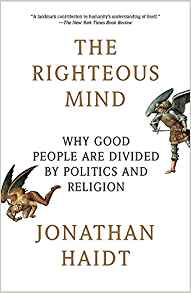The Righteous Mind by Jonathan Haidt
Par Eric Antoine Scuccimarra At first I wasn't going to write about this book because I wasn't sure I could be objective about it. I have developed some theories about psychology and this book offers evidence for many of those theories. I loved the book, but was unsure if I could really say anything meaningful about it as the confirmation bias made it difficult for me to be objective. However, after repeatedly bringing up the book in conversation I decided I should write about it.
At first I wasn't going to write about this book because I wasn't sure I could be objective about it. I have developed some theories about psychology and this book offers evidence for many of those theories. I loved the book, but was unsure if I could really say anything meaningful about it as the confirmation bias made it difficult for me to be objective. However, after repeatedly bringing up the book in conversation I decided I should write about it.
Ostensibly the book is about moral psychology, how and why people develop their moral beliefs and opinions. To answer these questions we need to go deeper into how the mind works, which is what I found most interesting. The common conception of the conscious vs unconscious mind holds that the conscious mind - the part of everyone that can think things through in words and logic - is in charge and the unconscious mind is mostly irrelevant. It may occassionally bubble some things up to the conscious, but it plays little to no role in making decisions.
I have written about my theory before, but basically I believe that the inverse is true. My previous metaphor had been that the conscious mind is like a sports announcer and the unconscious is the sports game. The announcer describes the action, but doesn't control it; viz the conscious mind is more about explaining and rationalizing the decisions made by the unconscious mind that actually participating in those decisions. Mr. Haidt provides a much better metaphor - he calls it the elephant and the rider. The elephant is the unconscious mind and the conscious is a person riding the elephant. The rider thinks the elephant does what he tells it to, but most of the time the elephant does what it wants. Haidt refers to the rider as a PR agent, who rationalizes the actions of the elephant and explains them to the rest of the world.
Looking at morality from this viewpoint offers a very different perspective. Typically one would say that ones beliefs and morality are arrived at by the conscious mind making decisions based on evidence. Mr. Haidt says that morality is instead decided by the elephant, independently of the conscious mind, which then goes about constructing post hoc explanations and arguments for it. This explains why it is so difficult to change people's opinions with facts, evidence or discussion. Attempting to convince someone that they are wrong assumes that the rider can change the opinion of the elephant. While this is possible, it tends to be rare - if the elephant doesn't have a strong opinion on a subject then the rider can maybe influence it; the rest of the time the rider has very little say.
The common misconception of a rational mind ruled by the conscious mind underlies a lot of important assumptions upon which our civilization is based. For example all modern economic theory is based on the idea that humans are rational actors who make all decisions based on maximizing their self-interest using the available information. If this was true then advertising as we know it wouldn't work - everyone would always choose whatever product offered the best value at the best price. The economic man is so far from reality that there is a joke that economics is based on an imaginary different species - homo economicus. Despite the fact that homo economicus doesn't behave anything like homo sapiens all economic theory is based on it, and the entire global neoliberal order is based on those economic theories.
The reason I feel so strongly about this subject is because you can't build theories on top of incorrect assumptions. Because these mistaken assumptions about psychology and how the mind words are so prevalent they corrupt an enormous amount of the theory of what our society is based on - from economics to criminal justice to psychology. Unfortunately I think these biases are inherent to all life forms with nervous systems. As I recently wrote about people's desire for immortality, I think that these biases are deeply ingrained in us by evolution. Just as no one can imagine being dead, most people can't imagine that their conscious mind is not in complete control. Because it is the conscious mind that does the imagining it is difficult to imagine itself out of the picture, and most people do not like to realize that they do not have as much control as they think they do over things. However until these illusions are dismissed, we are not going to be able to create social systems that are based on evidence and reality rather than wishful thinking.
Libellés: books, psychology